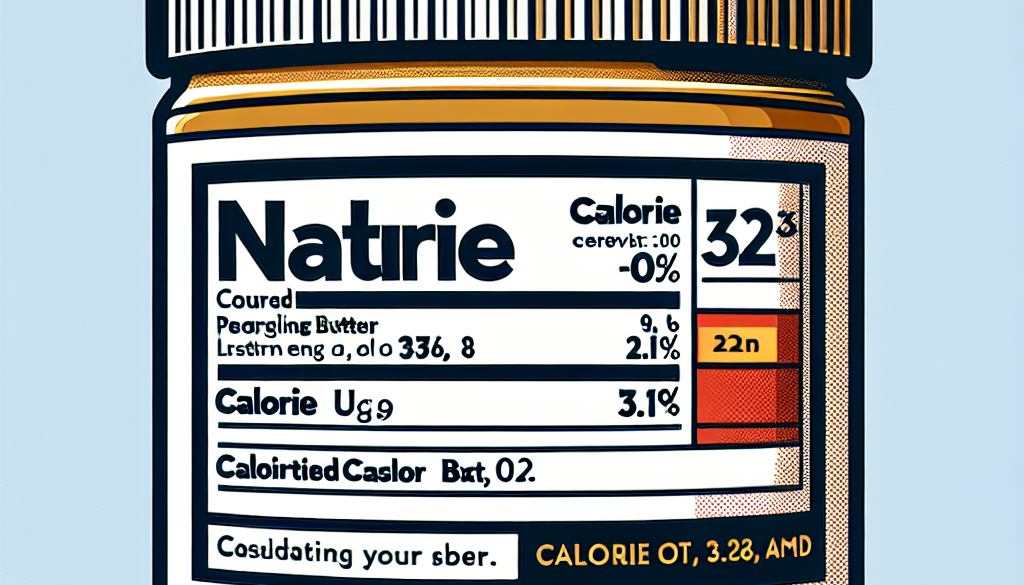3/4 Ounce Peanut Butter: Calorie Count
-
Table of Contents
- Peanut Butter Calorie Count: Understanding 3/4 Ounce Servings
- Caloric Content of 3/4 Ounce Peanut Butter
- Nutritional Profile of Peanut Butter
- Health Benefits of Peanut Butter
- Incorporating Peanut Butter into a Balanced Diet
- Comparing Different Types of Peanut Butter
- Case Studies and Statistics
- Conclusion: Balancing Enjoyment and Nutrition
- Discover ETprotein’s High-Quality Protein Products
Peanut Butter Calorie Count: Understanding 3/4 Ounce Servings

Peanut butter is a staple in many households, loved for its creamy texture and rich flavor. It’s a versatile food that can be spread on toast, blended into smoothies, or even used in cooking and baking. However, for those watching their calorie intake, understanding the nutritional content of peanut butter is crucial. In this article, we’ll delve into the calorie count of a 3/4 ounce serving of peanut butter and explore its nutritional profile, health benefits, and how to incorporate it into a balanced diet.
Caloric Content of 3/4 Ounce Peanut Butter
When it comes to calorie counting, precision is key. A 3/4 ounce serving of peanut butter, which is approximately 21 grams or 1.5 tablespoons, contains about 125 to 135 calories. This calorie range can vary slightly depending on the brand and whether it’s regular or reduced-fat peanut butter. Most of the calories in peanut butter come from fats, but it also provides protein and carbohydrates.
- Fats: Peanut butter is high in monounsaturated and polyunsaturated fats, which are considered heart-healthy fats.
- Proteins: It is also a good source of protein, which is essential for muscle repair and growth.
- Carbohydrates: Peanut butter contains a small amount of carbohydrates, a portion of which comes from dietary fiber.
Nutritional Profile of Peanut Butter
Peanut butter is not only about calories; it’s packed with various nutrients that contribute to a healthy diet. Here’s a breakdown of the nutritional content in a 3/4 ounce serving of peanut butter:
- Protein: Approximately 4 to 5 grams
- Fat: Around 11 to 12 grams, with a mix of saturated and unsaturated fats
- Carbohydrates: About 3 to 4 grams, with dietary fiber making up about 1 gram
- Vitamins and Minerals: Includes Vitamin E, B vitamins (especially niacin), magnesium, phosphorus, zinc, and potassium
It’s important to note that while peanut butter is nutritious, it’s also calorie-dense, so portion control is essential.
Health Benefits of Peanut Butter
Peanut butter isn’t just delicious; it offers several health benefits when consumed in moderation:
- Heart Health: The healthy fats in peanut butter can help lower bad cholesterol levels and reduce the risk of heart disease.
- Weight Management: The protein and fiber in peanut butter can promote satiety, helping to control appetite and support weight management.
- Muscle Building: As a protein-rich food, peanut butter supports muscle repair and growth, making it a favorite among athletes and bodybuilders.
- Energy Boost: The combination of fats, protein, and carbohydrates provides a sustained energy release, which is ideal for pre- or post-workout snacks.
Incorporating Peanut Butter into a Balanced Diet
While peanut butter is nutritious, it should be consumed as part of a balanced diet. Here are some tips for incorporating peanut butter into your meals:
- Choose natural or unsweetened varieties to avoid added sugars and unhealthy fats.
- Spread it on whole-grain toast or add it to oatmeal for a protein boost.
- Use it as a dip for fruits or vegetables for a healthy snack.
- Include it in smoothies or shakes for added flavor and nutrition.
- Be mindful of serving sizes to keep calorie intake in check.
Comparing Different Types of Peanut Butter
Not all peanut butters are created equal. Here’s a comparison of different types:
- Regular Peanut Butter: Made with roasted peanuts and often contains added oils, sugar, and salt.
- Natural Peanut Butter: Typically contains only peanuts and salt, with no added oils or sugars.
- Reduced-Fat Peanut Butter: Lower in fat but often higher in sugars and additives to compensate for flavor and texture.
When choosing peanut butter, it’s essential to read the label and select a product that aligns with your dietary preferences and goals.
Case Studies and Statistics
Several studies have highlighted the benefits of including peanut butter in the diet:
- A study published in the Journal of the American Medical Association found that consuming peanut butter could reduce the risk of type 2 diabetes.
- Research in the British Journal of Nutrition suggested that peanut butter consumption is associated with a lower risk of coronary heart disease.
- According to the National Peanut Board, Americans consume around 700 million pounds of peanut butter annually, indicating its popularity and potential impact on diet.
Conclusion: Balancing Enjoyment and Nutrition
Peanut butter is a delicious and nutritious food that can be part of a healthy diet when consumed in moderation. A 3/4 ounce serving contains a reasonable calorie count and offers a good balance of fats, proteins, and carbohydrates. By choosing the right type of peanut butter and being mindful of portion sizes, you can enjoy its benefits without overindulging in calories.
Discover ETprotein’s High-Quality Protein Products
If you’re looking to enhance your diet with additional protein sources, consider ETprotein’s range of products. They offer a variety of plant-based proteins, including peanut protein, that can complement your nutritional intake and support your health goals.
About ETprotein:
ETprotein, a reputable peanut protein Chinese factory manufacturer and supplier, is renowned for producing, stocking, exporting, and delivering the highest quality organic bulk vegan protein and plant proteins. They include Organic rice protein, clear rice protein, pea protein, clear pea protein, pumpkin seed protein, sunflower seed protein, mung bean protein, peanut protein etc. Their offerings, characterized by a neutral taste, non-GMO, allergen-free attributes, cater to a diverse range of industries. They serve nutraceutical, pharmaceutical, cosmeceutical, veterinary, as well as food and beverage finished product distributors, traders, and manufacturers across Europe, USA, Canada, Australia, Thailand, Japan, Korea, Brazil, and Chile, among others.
ETprotein specialization includes exporting and delivering tailor-made protein powder and finished nutritional supplements. Their extensive product range covers sectors like Food and Beverage, Sports Nutrition, Weight Management, Dietary Supplements, Health and Wellness Products, and Infant Formula, ensuring comprehensive solutions to meet all your protein needs.
As a trusted company by leading global food and beverage brands and Fortune 500 companies, ETprotein reinforces China’s reputation in the global arena. For more information or to sample their products, please contact them and email sales(at)ETprotein.com today.












